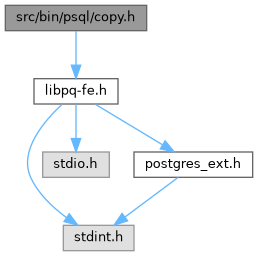#include "libpq-fe.h"

Go to the source code of this file.
Functions | |
| bool | do_copy (const char *args) |
| bool | handleCopyOut (PGconn *conn, FILE *copystream, PGresult **res) |
| bool | handleCopyIn (PGconn *conn, FILE *copystream, bool isbinary, PGresult **res) |
Function Documentation
◆ do_copy()
Definition at line 268 of file copy.c.
References appendPQExpBufferStr(), canonicalize_path_enc(), _psqlSettings::copyStream, _psqlSettings::cur_cmd_source, PQExpBufferData::data, disable_sigpipe_trap(), _psqlSettings::encoding, fb(), free, free_copy_options(), fstat, initPQExpBuffer(), parse_slash_copy(), PG_BINARY_R, PG_BINARY_W, pg_log_error, printfPQExpBuffer(), pset, _psqlSettings::queryFout, restore_sigpipe_trap(), S_ISDIR, SendQuery(), SetShellResultVariables(), stat::st_mode, success, termPQExpBuffer(), and wait_result_to_str().
Referenced by exec_command_copy().
◆ handleCopyIn()
Definition at line 511 of file copy.c.
References _, buf, conn, COPYBUFSIZ, _psqlSettings::cur_cmd_source, fb(), get_prompt(), _psqlSettings::lineno, pg_log_info, PGRES_COMMAND_OK, PGRES_COPY_IN, PQclear, PQerrorMessage(), PQgetResult, PQprotocolVersion(), PQputCopyData(), PQputCopyEnd(), PQresultStatus, PROMPT_COPY, pset, _psqlSettings::quiet, sigint_interrupt_enabled, sigint_interrupt_jmp, and _psqlSettings::stmt_lineno.
Referenced by HandleCopyResult().
◆ handleCopyOut()
Definition at line 434 of file copy.c.
References buf, conn, fb(), pg_log_error, pg_log_info, PGRES_COMMAND_OK, PQerrorMessage(), PQfreemem(), PQgetCopyData(), PQgetResult, and PQresultStatus.
Referenced by HandleCopyResult().